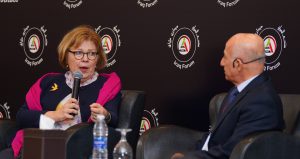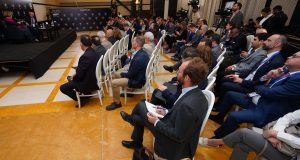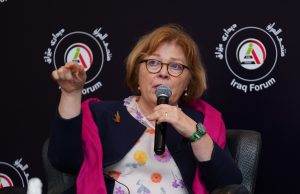- Barbara Leaf, Assistant Secretary of State for Near Eastern Affairs, USA
- Dlawer Ala’Aldeen, President of MERI (moderator)
The relationship between the United States and Iraq has gone through many phases, and this session, with US Assistant Secretary of State for Near Eastern Affairs Barbara Leaf, took stock of the dynamics between the countries, now over twenty years on from 2003. Under the previous administration and present day, with President Biden and Prime Minister Al-Sudani, the countries say stability and mutual trust is key, as the US continues to pledge its support to the state-building process in Iraq across multiple fields, including the security sector, economy, and the environment.
Iraq is a strategically important country in the Middle East, and offers the opportunity to build bridges and coalitions where the US cannot. Inevitably, the US-Iraq relationship is impacted by the United States’ relationship with other regional powers, and its dynamic with neighbouring countries – including Iran. This session looked at the broader strategy, and the challenges and opportunities for both countries ahead.
“Iraq is the keystone in the arch of the region… What is good in Iraq will be good for the wider region,” Barbara Leaf began, explaining the decision-making process of the Biden administration. “We view Iraq’s sovereignty as critical to everything that should be right about it… Every decision made is framed through whether it’s good for Iraq’s sovereignty.” The US-Iraq relationship is a “360 degree partnership,” Leaf continued, based on “Security, stability, and sovereignty,” and one that goes beyond building a strong Iraqi defence force, to include projects focused on the economy, climate change, and strengthening cultural ties.

Pressed by Dlawer Ala’Aldeen on why American businesses are not coming to the country, however, Leaf told the audience that Iraq must create a “business friendly environment,” and one where organisations and individuals are able to operate with transparency and predictability. “It is remarkable to me how the security environment is marching forward, and that is due to the good work of this government,” she added, praising the advisory role of her country in assisting the Iraqi government. “At this point, there is a lack of understanding in how Iraq is changing [to the outside],” Leaf noted. “Certainly in the US, outside the energy sector, there is no understanding of the possibilities among Americans,” she added, encouraging young Iraqis to visit America and tell their story. “There are all sorts of perceptions… My last trip out here was to nag Iraq’s leaders to get on with the process [of forming a government]. A year without a settled government was too long. We took the approach that we would work with the government that emerged, and judge it by what it does, not what it says.” Prime Minister Al-Sudani’s agenda is exactly the right thing, she continued. “It is exactly what the doctor ordered,” Leaf said, reiterating that the US will judge the government by what it does, rather than words alone.
Questioned by Ala’Aldeen on the recent government delegation’s visit to the US, calling for help with economic and financial issues in Iraq, Leaf told the audience: “We had a rich set of discussions about a variety of things… there was a lot of advice along the way. There are things that this government is doing right… We are getting into the mature stage of the relationship, offering advice to the Iraqi government but not imposing solutions.”

As the conversation turned to Erbil-Baghdad relations and the clear problems of governance in the Kurdistan Region with its fractured politics, Leaf warned: “In large terms, the message the US carries to Erbil is that disunity and internal fighting weakens you. You may not agree, but you must put your differences aside to serve the people… you’ve got to do it to unleash the economy.” One of Iraq’s most important assets is its youth, she said, and their power must be harnessed. “They’ve got to be able to start business and civil society organisations, and areas the government can’t reach. They are labouring under huge social and economic issues, exacerbated by climate change. … You have to create a space . Set your party differences aside, and look at the public good. Look at the threats on your doorstep,” Leaf added. “Don’t sit up on the mountain and wait for things to become apparent,” she said, giving the example of the Iraq-Turkey pipeline negotiations, which she said required unity.
Questioned on long term threats, Leaf was clear. “There are threats to the state’s authority, and here I’m thinking especially of armed groups,” she said. “Eventually the state will need to collect those up and make sure they are not acting outside the control of the authority.” Beyond Iraq, the official was questioned on the US-Turkey, and US-Iran relations, and in regards to Iraq. “Turkey is a complicated partner, trading partner and [military] installation partner,” Leaf said. “I have no doubt that this [Turkey’s military presence in Iraq] is objectionable to the people of Iraq… This is something we want to engage with you as you engage with the Turkish government, as the new government emerges this month,” she added. “Turkey argues that it feels threatened in northern Iraq, with threats from the PKK… [but] we don’t want to see troops roll into Iraq without your say-so,” she said. In regards to the Iraq-Turkey pipeline blockage, Leaf stressed the need for a reliable global supply. “I’ll confirm when I go up to Erbil [this week] that their view is the same,” she added, noting that the current problem is coming to a resolution.

Turning the conversation to the recent Saudi-Iran engagement, Leaf stressed: “Détente is the word I use… [it means] a relaxation in tensions. It’s a hugely good thing,” she added. “Is it reconciliation? No it is not. Is it good for the two countries to have better relations? Of course.” Explaining how the US welcomes Saudi engagement with Iran, she told the audience that they had told their diplomats, “Absolutely, go for it, and add it to the tool kit [of diplomatic engagement].” Nevertheless, Leaf warned, “Iran hasn’t changed its behaviour, fundamentally.”
Regarding Syria, Leaf was equally clear. “The US military mission in Syria is there for one reason and one reason only, to defeat ISIS. The threat remains quite real… The situation is [still] terrible for the Syrians living in the country. For the millions of Syrian refugees across the world, there is no chance to return,” she added. “Our approach has been consistent, none of which the regime has ever adhered to. A number of countries believe engagement will make the Assad regime better,” Lead said. “I am sceptical.”
Ala’Aldeen noted the signs of China’s growing presence in Iraq, “replacing Western companies and so on,” asking the official how the US sees Chinese presence and growth in the region. “China’s economic influence is growing,” Leaf agreed. “Is it good for Iraq if Western and Asian and Gulf firms leave this market and are replaced by Chinese enterprises? You tell me! But I know we [the US] can compete in the global market,” she said.
Iraq Forum: For Stability and Prosperity
2/05/2023
Policy Debate: The US Strategies in Iraq and the Wider Region
Session video

